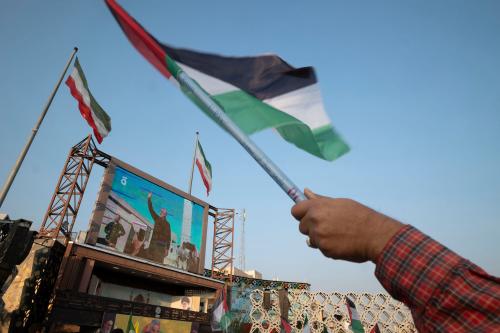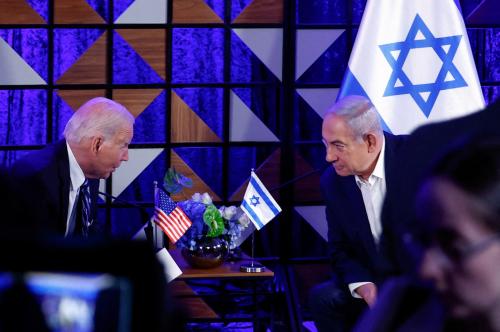Twenty-six days after terrorists struck at the heart of America, the United States struck back yesterday. In what is only the first salvo in an extended military campaign, U.S. forces launched attacks against key military targets in Afghanistan.
The goals of this operation are clear: to destroy the terrorist network inside Afghanistan and make sure the country will never again be used as a base for terrorism against the United States or any other country.
Washington’s decision to strike back is fully justified and enjoys widespread support at home and abroad. Prime Minister Tony Blair announced Britain’s support by joining the action, with British cruise missiles being among the first to be fired at targets deep inside Afghanistan. Other key U.S. allies, including Australia, Canada, France and Germany, offered forces for future operations. Another 40 countries supported the action indirectly by providing intelligence or opening their airspace to U.S. airplanes.
The initial salvo was measured. The immediate goal was to destroy the primitive air defense network of surface-to-air missiles, the Taliban’s small air force and whatever air-to-air artillery concentrations could be found. Additionally, such key military targets as ammunition depots, command and control sites, and communication sites (including radio transmitters) were likely also struck.
This initial goal serves a number of larger objectives. Having established air superiority, U.S. transportation aircraft can deliver much needed food provisions to many Afghans in need. It also opens up the door to what Defense Secretary Donald Rumsfeld called “sustained anti-terrorist operations”—presumably consisting of special forces searching and destroying the al-Qaida leadership, including Osama bin Laden himself.
Equally important is the explicit U.S. intention to shift the military balance of power inside Afghanistan against the Taliban government and in favor of rebel and other opposition forces. Ultimately, the aim is to force the ouster of the ruling Islamist extremists who, in turn, supported and are supported by the terrorist network surrounding bin Laden.
However welcome this initial military foray, it is well to remember that this is only the beginning—or the beginning of the beginning—of America’s new fight against global terrorism. Many critical challenges remain. Ultimate success will depend on meeting and overcoming each and every one of these challenges.
The most critical challenge remains locating Osama bin Laden and his lieutenants in the al-Qaida network—a challenge made only slightly less daunting now that military operations have begun. The importance of doing so was underscored by the quite incredible statement by bin Laden that was broadcast within minutes of the first bombs exploding in Afghanistan, in which he all but claimed responsibility for the Sept. 11 atrocities. Getting him and his senior aides remains as important today as ever.
Second, there can be little doubt that bin Laden has planned another devastating strike against America—most likely on U.S. soil. The challenge for the American intelligence and law enforcement communities is to prevent such an attack. Failing that, the challenge is to limit the consequences, in terms of both the number of casualties and the psychological impact another horrific event will have on the American psyche.
Third, there is the challenge of reconstructing Afghanistan after the Taliban is ousted. This is a country devastated by nearly a quarter century of unrelenting warfare. It is an ideologically and ethnically divided nation, economically destitute and a humanitarian nightmare. It will take a major international commitment—including many billions of dollars in assistance and a prolonged engagement—to get the country back onto its feet. The cases of successful international efforts at nation building are few; but nowhere are the strategic, political, and moral requirements for succeeding greater than in Afghanistan.
Fourth, the Bush administration needs to decide the scope of its anti-terrorist campaign. For much of the world, the primary focus today is on those who perpetrated the Sept. 11 attack and its immediate supporters. That is, Osama bin Laden, the al-Qaida network and the Taliban regime. For many, however, the scope of the campaign must be broader, including both every large terrorist organization with a “global reach” and the states that support them. In practical terms, this means Hezbollah and Hamas, as well as Iran, Syria and Iraq. While the Bush administration has wisely focused its current assault narrowly on Afghanistan, it may not end there.
And that raises the final challenge: the future of the broad, diverse international coalition that the administration has pulled together the past few weeks. Not only does this coalition contain some strange bedfellows, in many parts it’s being held together more by the memory of the horrors of Sept. 11 than by a commitment to fight the long and arduous campaign against terrorism.
It may hold in the coming days and weeks, as operations in Afghanistan proceed, though setbacks there may prove very challenging. But maintaining the coalition once the fight moves against terrorists, their networks and state sponsors beyond Afghanistan will prove difficult, if not impossible.
America has struck back at the terrorists who killed more people on U.S. soil than any single day in history. That was to be expected. The challenge will be to maintain the steadfastness and steadiness of purpose to get the job done—with others, if possible, but alone if necessary.



Commentary
Op-edThe Road Ahead Is Probably Uphill
October 8, 2001